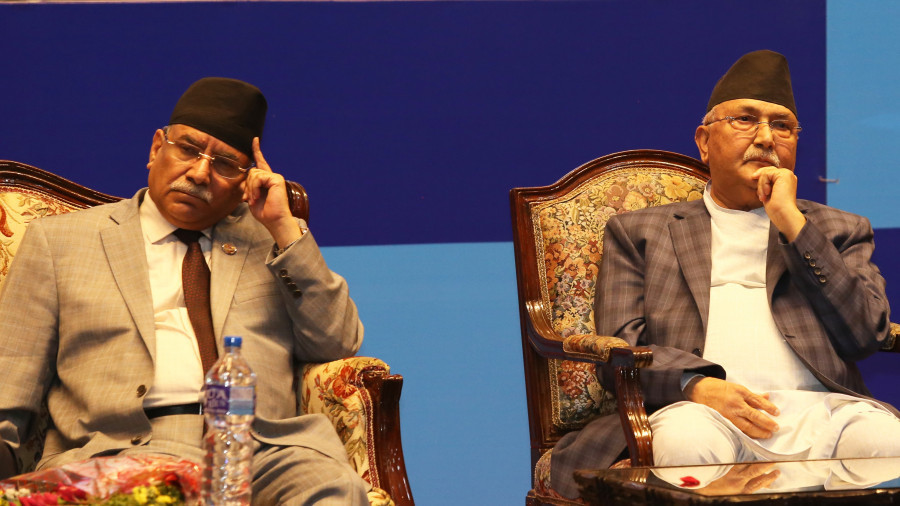National
With Oli backtracking, current truce may not last long, ruling party leaders say
Oli faces charges of reverting to his old style of functioning unilaterally despite reaching an understanding to take decisions based on consultation in the party.
Tika R Pradhan
Not even a month since Nepal Communist Party chairs KP Sharma Oli and Pushpa Kamal Dahal agreed for a truce, Oli seems to be backtracking.
When Oli and Dahal reached an understanding in the second week of September, Oli had agreed that all crucial decisions of his government would be taken after holding consultations in the party Secretariat and in consensus with top leaders.
For some days, it looked like Oli would not go back into his old mould and that he would run the government in consultation with the party. The understanding Oli and Dahal reached last month meant the former would lead the government for the full five-year term and the latter would run the party as “executive chairman”.
Soon after, the party called its Secretariat meeting on September 20 at Paris Danda, the headquarters of the former Maoist party. Oli attended the meeting.
“He has gone back to his old style of functioning again,” said a Standing Committee member close to senior leader Madhav Kumar Nepal.
The leader was referring to Thursday’s Cabinet decisions—to recommend Lok Darshan Regmi and Yubaraj Khatiwada as ambassadors to the United Kingdom and the United States and appoint Shanker Das Bairagi as chief secretary as Regmi’s successor. The Cabinet also recommended Nirmal Kumar Bishwakarma as ambassador to South Africa.
Party leaders from the Dahal-Nepal faction said they would raise the issues at the party committees, as Oli made the decisions without holding consultations, going against the spirit of the understanding reached last month.
In the ruling Nepal Communist Party (NCP), internal conflict once had reached the tipping point, as the Dahal-Nepal faction was demanding Oli’s resignation both as party chair and prime minister. It once looked like the party was headed for a split. But after weeks-long negotiations, the conflict subsided with the two chairs agreeing to take the party forward in the spirit of unity.
The faction led by Madhav Nepal was still unhappy. And leaders had wondered how long the September ceasefire would last.
“This is not surprising from Oli,” said Matrika Yadav, a Standing Committee member close to Dahal. “It was well known all along that Oli would not change his style.”
For the last few days, both Oli and Dahal were in regular consultation, with the focus on Cabinet reshuffle and various appointments, including ambassadors at missions and commissioners at constitutional bodies.
A leader close to Dahal said that the decisions on Thursday were abrupt and sudden. “Despite meetings between the two chairs for the past few days, discussions on today’s decision on ambassadorial recommendations were not held,” the leader told the Post requesting anonymity.
Party leaders from the Dahal faction have taken offence to Oli’s unilateral move and said that they would raise the issue at the party committees strongly.
“Oli has breached the understanding and trust,” said another Standing Committee member. “There is a need to hold serious discussion about it at the party meetings.”
Leaders close to Oli, however, said that the prime minister has already discussed Cabinet reshuffle and the appointments at the constitutional bodies and foreign missions at the recent Secretariat meeting. On Cabinet reshuffle, according to them, the prime minister will take a decision on his own as he will ultimately have to face the brickbats and bouquets for his government and he will just take party’s suggestions.
Despite talks going on for days, there has been no decision on the Cabinet reshuffle, at least for two reasons. First, Dahal wants Oli to recall all ministers and then appoint new ministers as per the new criteria devised by the party. Oli is reluctant. Second, a case against Bamdev Gautam’s nomination to the National Assembly has been pending at the Supreme Court, which has ordered the government not to give any additional constitutional position to Gautam until there is another ruling.
When conflict started in September last year in the party, the charges the Dahal faction had levelled against Oli were that the latter was running both the party and the government unilaterally. As the conflict snowballed, the Dahal faction gained strength and drove Oli into a corner. Oli, however, managed to turn the tables on the Dahal-Nepal faction.
“It is becoming apparent that Oli is backtracking on the understanding,” said Mani Thapa, a Standing Committee member. “The way the prime minister is acting, taking decisions on his own and saying that discussions have already been held, it looks like the current ceasefire will end soon. Conflict will raise its head again in the party.”




 11.12°C Kathmandu
11.12°C Kathmandu














